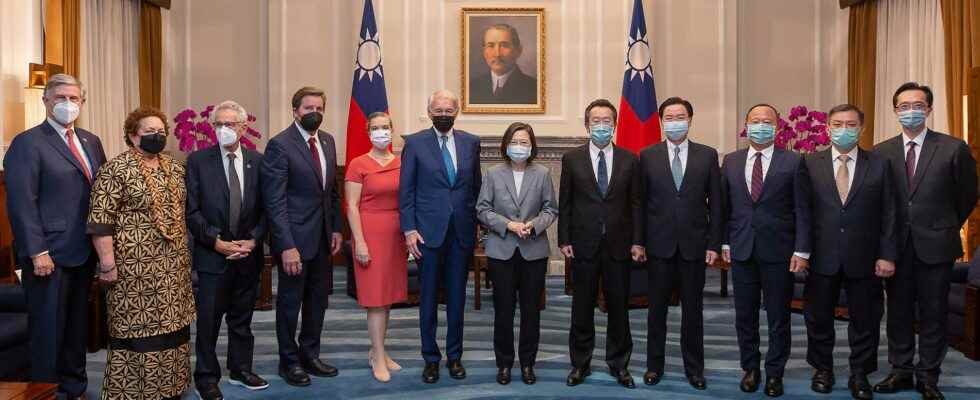Published: Less than 20 min ago
Additional military exercises are China’s response to the recent visit of US politicians to Taiwan.
– China exploits this in a way that escalates the situation around Taiwan. This might become the new normal now, says China expert Niklas Swanström.
Barely two weeks after Nancy Pelosi, the speaker of the US House of Representatives, visited Taiwan, a new American visit came to the island on Sunday. This time it was a congressional delegation that, among other things, met Taiwan’s President Tsai Ing-Wen.
On Monday, the Chinese military announced that additional exercises had begun at sea and in the air around Taiwan, in line with exercises conducted in response to Pelosi’s visit. The latest drills are meant to be a “resolute response and a serious deterrent to US-Taiwanese collusion and provocation,” China’s defense ministry said.
The timing affects
The fact that China reacted strongly even to the latest visit has probably been influenced by the timing, that it came so close to Pelosi’s visit, says Oscar Almén, researcher with the China focus at the Total Defense Research Institute (FOI).
Because since Pelosi’s visit, there is heavy pressure from within China on the politicians to act. Among many nationalists there is disappointment that the country did not act even harder when the speaker came to Taiwan. Therefore, the Communist Party must show itself strong and stand up to the United States, above all in front of its own population, says Oscar Almén.
– Now in the autumn, you will have a party congress and are most interested in it being calm and stable. Leader Xi Jinping is expected to be appointed for a third term as General Secretary and it is very important for him to show himself strong and not soft on foreign policy. At the same time, you don’t want to risk something happening now when it’s such a sensitive time, with covid and financial problems.
“Significantly greater pressure”
The American visits are not coordinated from the US side, even if China likes to make it sound that way, says Niklas Swanström, head of the Institute for Security and Development Policy (ISPD).
– They blame this on the United States and say that it is the American government that is trying to divide China, and therefore they consider themselves to have the right to use military means and increase the pressure, he says.
– Maybe this will become the new normal now, that as soon as there are new visits and as soon as there is something that China perceives as support for Taiwan, then these exercises are carried out. You are acting extremely provocatively.
Niklas Swanström believes that through its exercises, China escalates the tension in the area a few steps, only to be able to back off and say that it is back to normal again.
– But you’re not. Every time you create a conflict like this, you turn up the pressure a notch or two, so the new normal is significantly greater pressure and a radicalization of the situation, he says.
Mistrust and suspicion
Democrat Ed Markey, who leads the US delegation, tweeted that the purpose of the congressional delegation’s trip was to “reaffirm US support for Taiwan and encourage stability and peace across the Taiwan Strait”. But China sees formal visits between US politicians and Taiwan’s government as support for Taiwan’s independence. Above all, China worries that the US is changing its Taiwan policy, says Oscar Almén.
– There is a very basic mistrust on China’s part and we have to be aware of that when we try to understand this. The Chinese regime’s mistrust and suspicion of the United States should not be underestimated.
Facts
Taiwan
Taiwan consists of a main island and several smaller islands in the Pacific Ocean, east of the Asian mainland.
The nation functions in practice as an independent and democratic state, but is recognized as such by only a handful of countries. China sees Taiwan as a breakaway region that should be part of China.
China does not accept that other countries have relations with both Beijing and the Taiwanese government in Taipei.
Taiwan’s 23 million people have long lived with the threat of an invasion, but it has intensified under Xi Jinping’s tenure as president of China.
For strategic reasons, the US has chosen not to say clearly whether it will defend Taiwan in the event of an attack from China.
Read more
